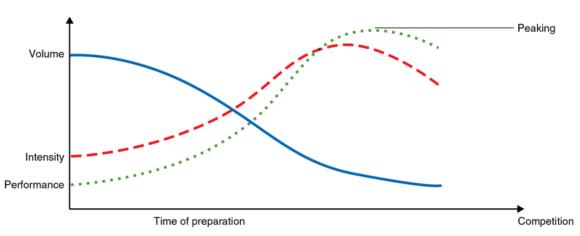Training Variables
This is an excerpt from Functional Training by Juan Carlos Santana.
The two main training variables in periodization are volume and intensity. Volume can be expressed in total repetitions (sets × repetitions) or total tonnage (repetitions × weight lifted). We will use the most common expression: total repetitions. In the beginning stages of training, volume is high. This allows athletes to practice and to develop efficient movement. In addition, it gives the connective tissues time to remodel and become stronger. As the training progresses, volume drops to allow the second variable, intensity, to come into play.
Intensity refers to the load of an exercise and has an inverse relationship with volume. Although various factors can influence load, intensity usually involves the weight used, or the resistance the body moves against. At the beginning of training, when volume is high, intensity is low. The lighter loads allow for more repetitions and a greater volume of work during the initial stages of training. As the training progresses over weeks or months, the volume of work decreases while the intensity of training increases (see figure 6.1).

Periodization model.
Other important variables to consider are frequency and duration of training. However, these variables are also methods of expressing volume and manipulating intensity. For example, an athlete who needs a high volume may spread the work over more training sessions throughout the day, reducing the volume of work at each training session while increasing overall volume. This high frequency reduces the time for recovery, and thus the intensity must be significantly lower to avoid overtraining. Conversely, if higher training intensities are needed, the duration of the training session must be reduced to sustain the higher work and power output.
Learn more about Functional Training.
More Excerpts From Functional TrainingSHOP

Get the latest insights with regular newsletters, plus periodic product information and special insider offers.
JOIN NOW
Latest Posts
- How do I integrate nutrition education into PE?
- How does the support of friends and family influence physical activity?
- What makes the Physical Best approach unique?
- Strength training gimmicks . . . or not?
- How do vitamins and minerals support our bodies?
- Why do many people have difficulty losing weight?


